BY LORIN MALLORIE
Asheville rallied to support Haiti after the 2010 earthquake, investing in ongoing relief and development projects headed by local organizations. Last month, however, Hurricane Matthew became the first Category 4 storm since 1964 to make landfall on the island.
Nearly seven years after the quake, it’s no secret that the multibillion-dollar aid response did little to help Haiti rebuild. In fact, the “humanitarian aftershocks” devastated the nation, triggering a range of harmful albeit unintended consequences.
Asheville understands that sustainability and buying local are crucial parts of protecting a growing culture, and translates those ideas in Haiti as well. By consistently working on the ground in Haiti, supporting its communities and local commerce, Asheville-based organizations continue leading the charge for a new, empowering approach: solidarity, not charity.
Consider Haiti
“The good news is, all staff and families in our programs survived. But we lost homes and livestock in the mountains, so we will need to rebuild.”
— Asheville resident Todd Kaderabek
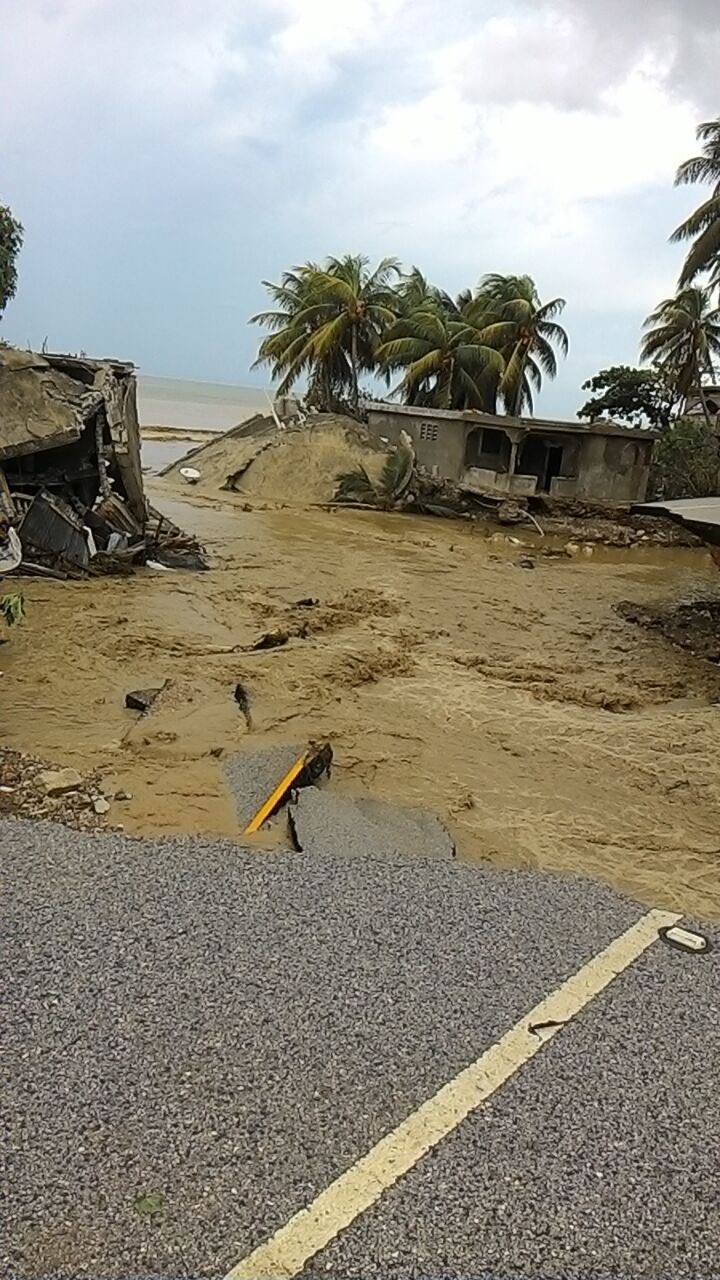
For more than 15 years, Asheville’s Consider Haiti has pioneered self-sustaining development by supporting local teams to implement community medical care, nutrition and clean water programs. Focused on Montrouis, a coastal section of western Haiti’s central plateau, the organization has one objective: promoting the health and welfare of children in Haiti.
Hurricane Matthew left an estimated 1.4 million Haitians in need of food assistance, according to a recently released report by the government of Haiti and the United Nations.
“The farm in Montrouis is a mess. An 8-foot storm surge took out the front gate, and water covered the entire place,” board President Todd Kaderabek, an Asheville real estate agent, said just days after the hurricane’s initial impact. “Lots of trees are down, the nursery is gone, the crops are gone. Again, we will rebuild.”
The storm destroyed an estimated $538 million worth of crops and productive infrastructure, according to the Haitian government and the United Nations’ Food and Agriculture Organization.
“I am hoping the grassroots connection between Asheville and Haiti, and helping spread and share the love, will become Asheville’s best export,” says Ashleigh Stoia, Consider Haiti’s public relations representative. “We know our message will resonate with Ashevilleans who really want to make a long-term difference.”
Homes, crops and goats were lost. “The gate of the farm was torn off by the wind, and we had to lift and retain it by ropes,” community health agent Eddy Prophete reported. “The wind ripped a lot of banana trees, and the ocean flooded the frontage road.”
Two dozen goats were lost in the storm. With a herd of more than 700, Kaderabek said it would quickly replenish. In the meantime, howver, “It’s a day-to-day livelihood removed from many families.”
In 2010, Kaderabek told Mountain Xpress that the organization’s goal was to make its operations in Haiti obsolete. “We want to empower Haitians to become independent of any and all aid: We want them to be self-sufficient.”
Haitians helping Haitians
Six years later, Consider Haiti has almost completely segued into a “Haitians Helping Haitians” model with financial backing from the nonprofit. “Not surprising at all: It works very well,” Kaderabek says with a touch of well-deserved pride.
Nonetheless, local donations to Consider Haiti were low last year, Stoia reveals. “We are way behind on what we need to support our current programs, and with the recent devastation of the hurricane, we need even more support than that.”
There are many great causes out there, notes the Asheville-based mother of four, but when people give to Consider Haiti, their money is going directly to help Haitian children and their families.
“You can literally track where the money is being spent,” she says, “whether it’s to buy a goat to produce milk to sell for family income, to purchase a water filter for clean water for a community both to drink and to sell, or to purchase seeds or sustainable nutritional resources for children in our programs.” And with local infrastructure already in place, they don’t need a paid, American staff, even for disaster relief.
Perhaps most importantly, the organization doesn’t buy U.S. resources and ship them to Haiti.
“So many organizations and nonprofits do, and it ends up really hurting the developing world countries more than it helps,” Stoia explains, citing TOMS shoes as a well-known example of the unintended consequences of foreign aid.
According to a 2014 University of San Francisco study titled “Do In-Kind Transfers Damage Local Markets?”, such donations of materials from abroad can inadvertently replace local markets, undermining long-term development.
“The only things we send to Haiti are seeds to plant, medical supplies for our volunteer medical trips and money we raise to support the programs,” notes Stoia. “Everything else is purchased in Haiti, and all our employees are local Haitian community agents.”
Through Consider Haiti’s sustainable, renewable and long-term programs, families in become economically viable and independent, she says.
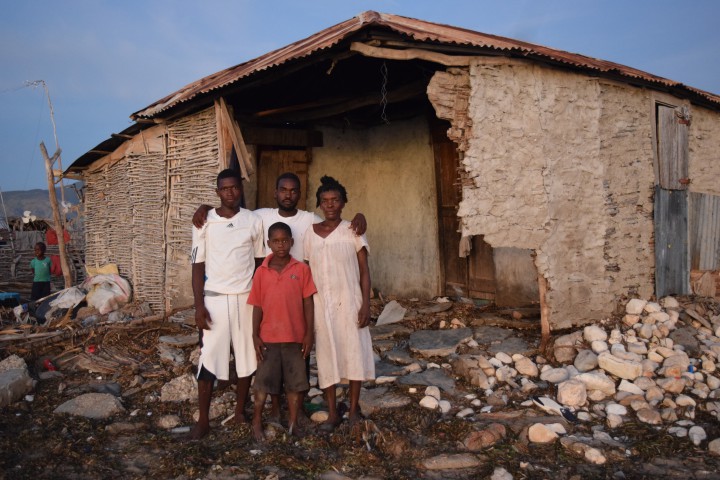
Know your community
“I’m in the south. It looks like the earthquake. Whole towns reduced to rubble.”
— UNC Asheville alumna Amber Munger
Amber Munger works for the American Jewish World Service, whose mission is ending poverty and promoting human rights in the developing world. “There are many great Haitian organizations, but none of them are set up to receive international funds directly,” Munger explains. “AJWS doesn’t execute any projects — it exclusively funds grassroots organizations and their allies. “That is why I love it so much: No projects!”
The nonprofit’s rapid response model first reaches out to partners on the ground, then mobilizes financial support from its international donor base. Listening to those who know their communities well, the organization ensures that the right kinds of help reach the most vulnerable populations across the globe.
According to its Hurricane Matthew update, the nonprofit is sending emergency relief funds to trusted Haitian and Dominican organizations that are helping survivors rebuild damaged homes and infrastructure, manage the spread of cholera, and aid populations left without shelter, sustenance and clean water.
“Our work will focus on cholera, building and equipment repair for community radios and supporting some small community projects,” Munger told Mountain Xpress immediately after the storm.
The organization also works to strengthen border communities, so Haitians don’t feel pressured to emigrate to the Dominican Republic, particularly given the Dominican government’s increasing animosity toward Haitian immigrants.
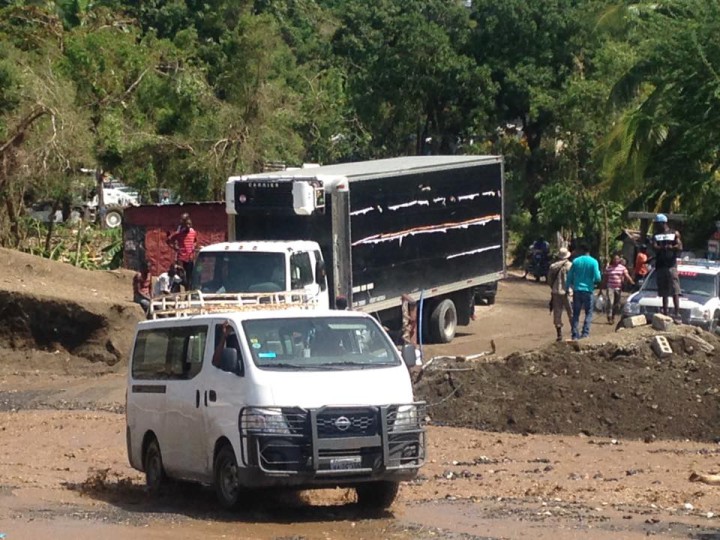
After the 2010 earthquake, Munger said, “The development approach we’ve had for Haiti for the last 30 years hasn’t worked, and it’s created the current situation. Now is as good a time for change as any.” Sadly, things in Haiti today are worse than before the earthquake, she says.
Much worse.
The post-quake Haiti/Clinton connection gained media attention in June when a Donald Trump surrogate accused the Clinton Foundation of taking “hundreds of millions” for a hospital that was never built. And while The Washington Post found no merit in the claim, there’s plenty of controversy about the foundation’s role in Haiti following the 2010 disaster.
According to the Post, some Clinton-backed projects, such as a $2 million housing program, never came to fruition. Others, funded by U.S. taxpayers, essentially failed because of poor planning and unsustainable outcomes. And in 2015, Haitian activists protested outside the foundation’s New York office, claiming the Clintons had mismanaged hundreds of millions in taxpayer money.
“It was always so hard because I would say, ‘Fund local organizations!’ But people always ask, ‘Yeah, but how do we do that?’ It’s not like they all have websites with GoFundMe pages!” notes Munger, who first visited Haiti as a young adult. “So that’s where AJWS comes in: Local organizations tell us what they want to do, and we fund them. Sometimes we exclusively give operational support to activist organizations.”
Since its founding, the American Jewish World Service says it’s provided more than $316 million to support thousands of social justice organizations in the developing world.
No novice to Haiti’s development struggles, Munger says she’s thrilled to help the nonprofit’s partners finance effective and empowering programs.
“Most of what we fund is organizing and advocacy, also some local NGOs providing services to the social movement, like human rights reporting, independent radio stations and legal fees to defend partners who are arrested or persecuted,” she explains.
“I love my work!”
A looming spike of cholera among Haiti’s most vulnerable populations further amplifies the importance of the organizations fighting for justice and human rights in the aftermath of Matthew.
U.N. peacekeepers relocated from Nepal to Haiti after the 2010 earthquake imported the deadly cholera bacterium, infecting Haiti’s Artibonite River and killing more than 9,000 Haitians to date. The New York Times reported recently that the U.N. finally plans to make cash payments to victims out of a proposed $400 million cholera response package, but the agency’s Office of Legal Affairs still refuses to take legal responsibility for the devastating outbreak.
Munger and her 3-year-old daughter, Anna, moved to the Dominican Republic last year to give her daughter a decent education. In Haiti, there is no free public education, and because of the extremely limited resources and infrastructure, even a mediocre education rivals the cost of a private school in Upper Manhattan, she explains. When Munger has to travel for work, she takes the short flight from Santo Domingo to Port-au-Prince.
After more than a decade of hard living in rural Haiti, Munger admits she enjoys the more peaceful pace of the island’s Spanish side. “I live in the Colonial Zone, where all the tourists come to relax, see the sites and listen to the wandering musicians,” she says. “It reminds me of Asheville.”
Ananda Marga Universal Relief Team
“The situation is critical and requires an immediate response which is integrated, durable and targeting the most vulnerable population.”
— UNC Asheville alumnus Demeter “Dharma” Russafov
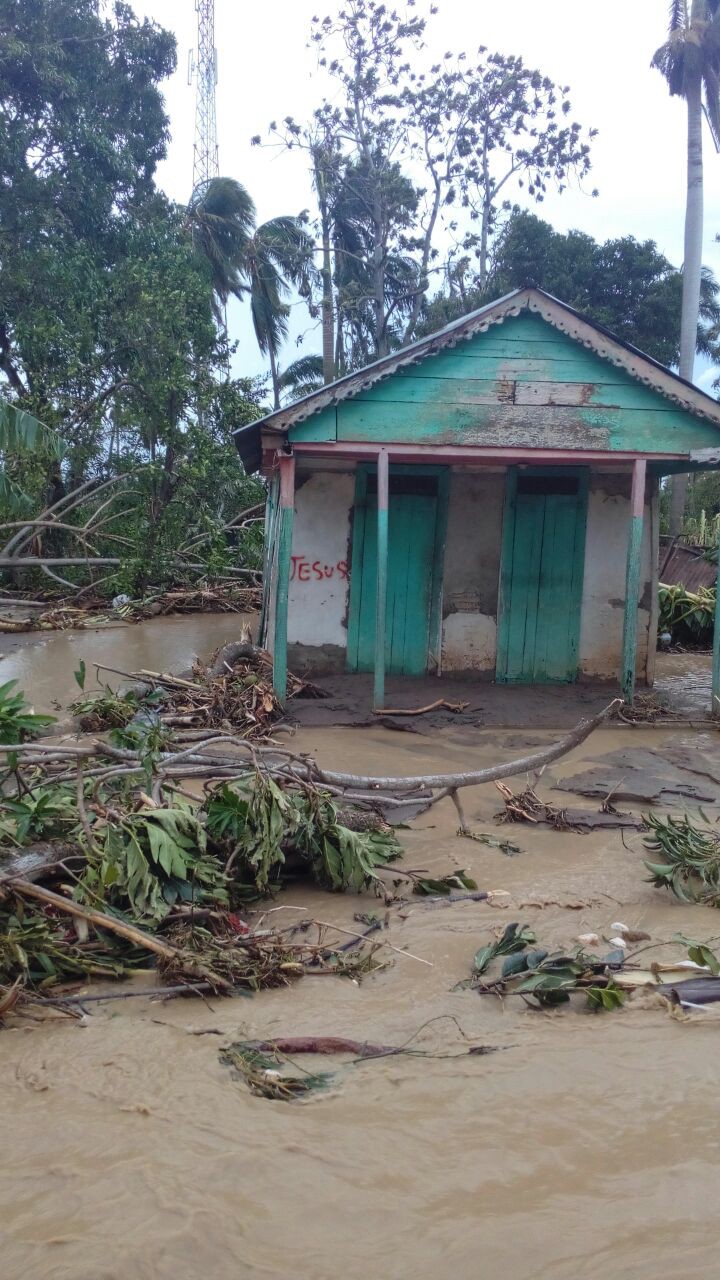
“The majority of the roads are severely impacted,” Demeter “Dharma” Russafov wrote from Haiti just after the storm. “Access to most inland areas is very difficult. The main road between Anse-Rouge and Gonaïves is severely damaged.”
Russafov heads up the Ananda Marga Universal Relief Team, which operates a wide variety of projects in Haiti. The group says the northwest community’s greatest needs are: emergency food, water, sanitation, medical and emergency kits, temporary shelter, child-friendly spaces and cash for work programs to clear debris and repair roads.
In phase two, the organization will focus on creating livelihoods, cash for work programs protecting watersheds and coastal areas, and rebuilding schools and homes. The complete lack of basic services has made this already impoverished and isolated corner of Haiti even more vulnerable.
“The real crisis will deepen week by week, as the sparse stocks of seeds and supplies begin running out,” says Russafov. “With the major sources of livelihoods (particularly salt and farming) severely impacted, those most vulnerable have lost the only source of meager income that’s helped them meet their basic food needs.”
His organization found more than 1,500 homes and five schools destroyed or severely damaged, more than 200 livestock killed. “The damage extends inland also,” he notes. “Most of the irrigation canals have been destroyed, farms wiped out, livestock lost, salt basins submerged in mud, and many trees uprooted.” Before the hurricane, salt was these residents’ main source of livelihood. “We have a staff of 70 in the northwest communities, and they have temporary shifted focus away from the ongoing watershed protection program and toward relief preparations.”
The Universal Relief Team also has three long-term initiatives in the area. InnovEd offers professional development pathways for practicing teachers, 80 percent of whom lack qualification. ESPRI, meanwhile, aims to modernize salt production’s value chain through a focus on women’s cooperatives. And a large Cash for Work program employs 5,000 vulnerable people protecting watersheds, planting trees and building roads.
“The two initiatives we’re most excited about are InnovEd and ESPRI, as we feel their results are durable,” notes Russafov. But as is so often the case in this vulnerable, deforested island nation, critical disaster response must take precedence over long-term agendas. Accordingly, the group is setting up child-friendly spaces for the most impacted communities of the northwest.
Even before Matthew, the U.N. had already designated northwestern Haiti an “extreme vulnerability zone” due to a three-year drought. “Now,” says Russafov, “the farming and environment of the entire area has been devastated and has led to increased migration, the spread of cholera and a shrinking of livelihoods. The newly polluted water sources and very poor sanitation raise the danger of the expansion of the cholera epidemic that still plagues the region.”
Freelance journalist and publicity agent Lorin Mallorie is traveling in Haiti to continue her reports.




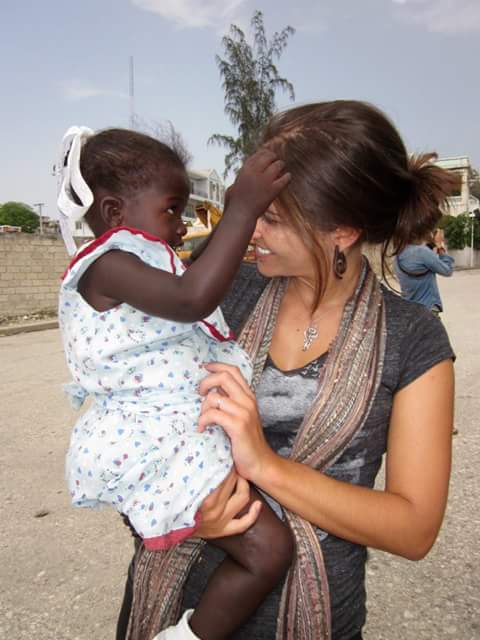
Give these folks a call and ask for an accounting of the millions they “helped” dispurse on Haiti.
https://www.clintonfoundation.org/ And don’t forget to tap that big orange Donate button.
But, you won’t be able to reach Hillary right now because she’s busy trying to disrupt the election outcome. You know, after she ripped Trump a new one when he said he’d wait and see about accepting election results. Seems you can basically count on Democrat politicians (and celebrities!) doing the opposite of what they say or promise. At least they’re consistent!
Meanwhile, thumbs-up to the local people that are truly trying to make a difference for Haitians, who very much need it.
Helping Haitians to become self-sustaiing is essential. Unless we help Haitians to maintain wells, clinics, schools, etc. then there is no lasting impact (wells break, teachers need to be paid, clinics need equipment/supplies). We’re Singing Rooster & believe an inroad to self-sustainability is by supporting farmers. Haitian coffee & cacao are world-class and when you pay farmers directly (not middlemen), the money stays in Haiti’s rural communities. We invite people to join us: https://singingrooster.org